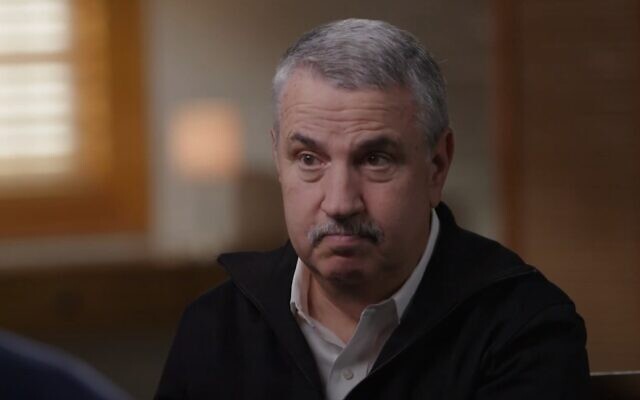President Isaac Herzog’s task in Washington was as simple as it was delicate. With two dangerous rifts emerging – between US leader Joe Biden and Prime Minister Benjamin Netanyahu, and between government and opposition supporters in Israel – Herzog’s visit provided a timely opportunity to build bridges across the chasm.
Initially, it seemed that Herzog may have at least succeeded in preventing Washington and Jerusalem from moving further afield.
Hours before Herzog flew from Israel to Washington — an invitation Netanyahu had been waiting for since returning to office — Biden spoke with the prime minister by phone in an apparent attempt to downplay the magnitude of the humiliation. It seemed He eventually invited Netanyahu for a meeting, although it is not yet clear whether the meeting will take place at the White House.
Biden’s change in tone was even more noticeable in his meeting with Herzog on Tuesday.
During his remarks to the press, after his administration repeatedly pressed Netanyahu’s government in recent months to pursue its original version of judicial reform and warned against only adopting reforms that had consensus support Didn’t mention this issue at all. ,
He did not remind Israel that the bilateral relationship is rooted in democratic values, his not-so-subtle warnings about the potential implications of successfully passing judicial reform, and avoided settlements, a two-state solution, and other potential areas of friction. Netanyahu’s far-right coalition partner.

Israelis protest against plans to reform the judicial system by Prime Minister Benjamin Netanyahu’s government in Tel Aviv, Israel, July 18, 2023. (AP Photo/Oded Bailty)
Instead, Biden told Herzog about his love for Israel, describing it as “deeply rooted and long lasting”.
“It is a friendship that I believe is unbreakable, unbreakable, and together we are working to bring greater integration and stability to the Middle East,” he added.
a message via freedman
But it didn’t take long for it to become sadly clear just how far the gulf between the governments really remains, and Herzog’s largely symbolic journey may not be enough to bring them back together.
The White House statement at Tuesday’s meeting returned to the subtly critical language the administration has been using since Netanyahu returned to power. It noted that Biden said the US-Israel relationship “is based on a bedrock of shared democratic values”, with hints that if the reform is passed, the foundation of the relationship would be shaken.

President Joe Biden and President Isaac Herzog of Israel speak in the Roosevelt Room of the White House on July 18, 2023 in Washington. (Chris Kleponis)
It also said the leaders “discussed the need for a consensus-based approach to the judicial reform package”, a stark contrast to the emerging situation in which the coalition is set to pass changes unilaterally over increasingly desperate opposition from the opposition.
The statement said Biden spoke about another area of ongoing disagreement, the Palestinian state.
“President Biden reiterated his commitment to maintaining a path to a negotiated two-state solution to the Israeli-Palestinian conflict, the best way to a lasting and just peace, and to provide an equal measure of freedom, prosperity and security to Israelis and Palestinians,” the US readout said.
Secretary of State Antony Blinken, who had repeatedly lectured Israeli leaders on democratic values when he visited Israel in February, returned to the same themes ahead of his meeting with Herzog.

Secretary of State Antony Blinken talks with President Isaac Herzog, July 18, 2023 (Office of the President)
“In fact, we have a unique relationship based on our commitment to Israel’s security as well as democratic values,” Blinken said.
He also indicated that failing to find a solution with the Palestinians would weaken Israel’s status as a democracy. He added, “A two-state solution is essential to Israel’s long-term security and its status as a democratic and Jewish state.”
But most worrying for the future of the relationship was an interview Biden gave to New York Times columnist Thomas Friedman hours after his warm meeting with Herzog. That interview – to which Biden devoted more time than Herzog – was intended to make abundantly clear that the US president was not convinced either way.
Biden, who had not warned Herzog that he was about to make headlines that would affect their friendly meeting, told Friedman that he expressed his concerns over the judicial change to Herzog.

Thomas Friedman in 2019 (YouTube screenshot; used in accordance with section 27A of the Copyright Act)
According to Friedman, Biden wanted to convey that if the judicial overhaul proposals passed, “you would be breaking one of the most important bonds between the United States and Israel, our shared values around democratic decision-making and an independent judiciary.”
To remove any doubt, the White House reiterated that Friedman’s article “directly quotes the President” and Biden’s “comments made in the article”. [themselves]”Wednesday, the same day Herzog addressed Congress –
And on Thursday, National Security Council spokesman John Kirby again insisted to Israeli news that Friedman’s article was an “accurate reflection” of this conversation with Biden.
woman protests too much
Herzog’s other showcase event on his trip was his address to a joint session of Congress. The speech was, in many ways, classic Herzog. It was a mixture of family history, Jewish teachings, Biblical references, and ultimately, a vision of Israel’s future as a nation that contributes to the welfare of humanity.
He attempted to present Israel not as a junior partner dependent on the US for its existence, but as a full, co-equal ally facing similar challenges.

President Isaac Herzog addresses a joint session of Congress at the US Capitol on July 19, 2023 in Washington. (Saul Loeb/AFP)
“It is clear that America is irreplaceable to Israel,” he said, “and Israel is irreplaceable to America. Now is the time to design together the next phase of our growing friendship and our growing partnership.
But when a world leader has to repeatedly reiterate that his country is a liberal democracy, it seems there may be reason to doubt that claim.
British Prime Minister Margaret Thatcher said, “To be powerful is to be a woman.” “If you have to tell people you are, you are not.”
The leaders of most Western democracies do not need to brag about their free and fair elections and minority rights. When Israel’s leaders do this, even as a bipartisan crowd stands and applauds, it is a sign that something is wrong.
It is unclear how much of Biden’s message has reached Netanyahu or his allies, but Herzog, who has led negotiations on the overhaul law, reiterated Biden’s comments on Israel’s domestic conflict, noting that Israel’s “vibrant” Democracy is “safeguarded by its strong Supreme Court” and independent judiciary,” which appeared to be a clear condemnation of the government’s plan, which would reduce the independence of the court.
The President will have much to be proud of on his visit. There isn’t much that brings the parties closer together in America, and to see hundreds of lawmakers lined up on either side of the aisle is an important statement of the breadth of support for Israel abroad.
“I have appeared before many parliaments, but it was very moving to see the enthusiasm there,” he said on Thursday.
His personal friendship with both Biden and Vice President Kamala Harris was evident. And he met with members of the Congressional Black Caucus, who represent a community with which Israel has had trouble finding common ground.
Tomorrow, @senbooker and i had the honor of meeting him @Isaac_Herzog before their joint address.
We discussed how the Black and Jewish communities can join together and create a future based on understanding and respect.
Together, we can draw strength from our diversity. pic.twitter.com/wTzYgodkYs
— Rep. Steven Horsford (@RepHorsford) 19 July 2023
“One thing was very clear,” Herzog told reporters in New York on Thursday. “There is love for Israel on both sides of the aisle, despite the perception in Israel that it is a lost cause.”
But when he flies back to Israel on Saturday night, Herzog will be heading back into a political maelstrom that is growing more dangerous as it erodes the ties that unite Israeli society. Fair or not, this fight is preventing the US President and Israel’s Prime Minister from focusing on the Iranian threat and moving forward on the Abraham Accords.
Always the dogged optimist, Herzog would keep his head down and pressure the parties to come to some agreement on judicial reform. And he’s excited about the future of the US-Israel relationship. But changing that reality may require more than positive cheer and symbolic meetings that are becoming more problematic with each passing week.